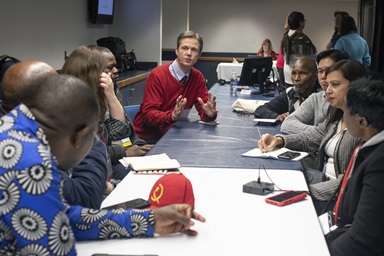“I’ve been to 16 different schools in two states since the age of 4,” said Jasmine Franklin, a first-generation college student at Clark Atlanta University. Wherever Jasmine’s mother moved, she and her twin brother Jason followed. College never crossed her mind until Jason’s death. “I felt as though I needed to make my brother proud,” she said.
Clark Atlanta is one of several United Methodist-related colleges and universities that are making higher education more accessible to students like Jasmine who are the first in their families to pursue a four-year-degree.
“Access to all is one of our core principles in United Methodist-related schools, colleges and universities,” said Gerald D. Lord, associate general secretary, Division of Higher Education, United Methodist Board of Higher Education and Ministry. “Today, we continue to live out John Wesley’s vision of educating moral and ethical leaders regardless of gender or class in our 800 institutions globally.”
To increase success for first-generation college students, institutions in the United Methodist education connection provide mentoring opportunities ranging from financial aid to learning the basics of campus life.
“Once they get here, it is like landing on Mars,” said Linda Jacobs, director of academic services at Adrian College in Michigan.
USA Today reports that first-generation college students are four times more likely to drop out than their peers, whose parents have college degrees. With the help of mentors — many of whom were also first-generation college students — undergrads at United Methodist-related schools are defying odds.
Advisers are passionate about their work and their students because it is personal. Jacobs was a first-generation, low-income student. Her parents encouraged working instead of going to college, which they “thought was only for people with money.”
‘Do not give up’
Even though Jacobs graduated from high school within the top-25 percent of her class while maintaining two jobs, her school counselor never spoke with her about the possibilities of higher education. “As a result, I never learned that there was support available for students like myself, and my entrance to college was delayed until later,” she said.
Dr. Cynthia Clem, assistant dean of the office of undergraduate studies at Clark Atlanta, is one of Jasmine’s mentors. “There is nothing different about me,” she said. Clem believes she is living her destiny. “My personal testimony and account of my own struggle helps students realize that I can be their witness that it is possible. I openly share my story, and there are times that they get down and out and wonder how they’re going to do this.”
Even as a senior with honors, Jasmine said she sometimes still feels the pressure and fear of “being another statistic.” At times, she has wanted to quit. However, this psychology major is more determined than ever. After graduation this spring, she will pursue medical school with the goal of opening her own practice in pediatric neurology.
Until then, like her mentors, she wants to give back to younger students who face the same issues. Since her sophomore year, she has served as a peer-teaching assistant in the first-year seminar program, and she has plenty of advice.
“Find a mentor who genuinely cares about your livelihood, not only academically, but also as a person. Get to know your professors and the administration because they are valuable resources. Do not stress about the workload because it is only temporary, and it will get easier to manage over time. Do not give up.”
The Division of Higher Education supports over 100 colleges and universities affiliated with The United Methodist Church. To find a United Methodist-related college or university, click here.
Like what you're reading? Support the ministry of UM News! Your support ensures the latest denominational news, dynamic stories and informative articles will continue to connect our global community. Make a tax-deductible donation at ResourceUMC.org/GiveUMCom.







